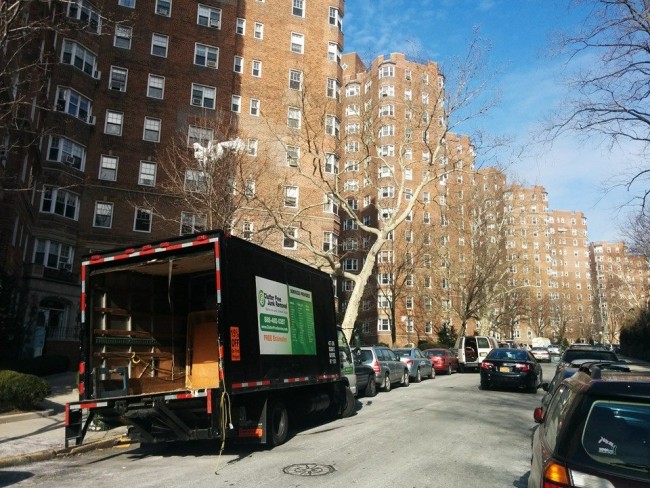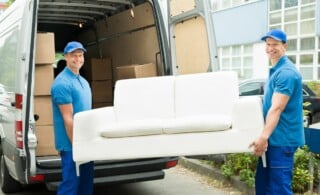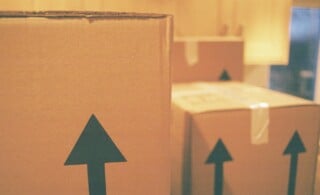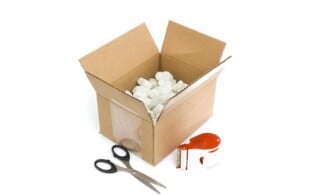
If you are reading this, you are either seriously considering using a professional mover or you have already chosen one to move you. If you have a family of more than three people and a house full of things to move, a professional mover is most likely the best option for you. However, a professional move is much different than moving yourself. Use this checklist to prepare yourself for this upcoming event. While hiring a professional service adds to the overall cost to move, it can alleviate a lot of the hassle and exhaustion that comes with it.
Preparing for the Physical Move
- Hire a Moving Company: Hire a moving company first thing. These services can easily get booked up and leave you stranded. The sooner the better.
- What to Pack: Pack all of your food, cleaning supplies, chemicals, soaps, and shampoos. Moving companies will not take food, chemicals, or cleaning supplies. Don’t worry with packing things yourself. Moving companies need to pack everything so that they can stand behind the packing job. If something breaks, they have to know with certainty that it was their fault.
- Garage Sale: A garage sale is a smart way to reduce some of your possessions and maybe even make a little gas money for the move.
- Thrift Store: Make a trip to a thrift store to give away what you couldn’t sell. Remember to get receipts and write-off forms for the value of what was donated.
- Road Supplies: Make a list of things that you want to have in the car with you, either to eat, drink, or occupy your mind.
- Lodging Reservations: If you will be stopping in an area with many lodging choices, it is best to grab a room when you arrive to get the best price. But if you don’t want to drive around looking for places, then reserve a room in advance. If you are camping in a state park, it is best to reserve a space before you leave.
- Always Double-Check: Double-check reservations at campgrounds, hotels, motels, Aunt Jane’s just to be on the safe side.
- Travel Entertainment: Bring games in the car for the kids to entertain themselves.
Moving Day
- Be Available: Depending on the moving company and how they pack, someone needs to be at your new home who can direct traffic for the movers. What box goes in what room, what bedroom set goes in which bedroom, and someone to keep the children out of the way.
- Tipping Your Mover: It is customary to tip your movers, after all they have successfully moved all of your things into another home without breaking anything and made your life that much easier. The amount is completely up to you, and is certainly contingent upon how easy they were to work with, if anything was broken, timeliness, etc.
Closing Down Shop: Moving Related Items
Since you are using professional movers, really all you are left to do is unseat yourself from your neighborhood and city. You have made a life there, full of friends, banks, hospitals, leagues, and tons of other things. Because of this, you have many things to pull together that aren’t necessarily going in the moving truck, and this list is your best guide for what to do and when.
Ready to start your professional move?
Find Pros4 Weeks Out
- Appraisal of Current Needs: Before you even think about moving things that you don’t even want anymore, consider if you have anything that needs to be replaced. Why move an old mattress when you could have a brand new one waiting in your new home? Think about other large items that will be expensive to transport and consider buying the item new in your new city.
- Credit Report: If you have purchased a new home, chances are that a credit report has already been completed. However, checking your credit a couple times a year is a great idea just to make sure than no errors appear.
- Appraise Valuables: Standard insurance plans cover general possessions up to a certain dollar amount, but if you have some more expensive items like a big screen TV that you need to insure, now is the best time to have your possessions appraised before you take them on the road.
- Tax-Deductible Moving Expenses: Do some research with your accountant or an accountant who specializes in tax-deductible moving expenses, to see what is tax-deductible for your particular move.
3 Weeks Out
- Medical Records: Grab medical records not only for your whole family but also for your pets. Make copies while you have them and a file where they can be stored until you find another physician and veterinarian.
- Transfer Prescriptions
- Return Borrowed Items: You will have new neighbors now, and while some people keep in touch with their old neighbors, it is a good practice to return anything you have borrowed and ask for what they borrowed from you.
- Update Memberships: Update your auto club membership or if you don’t have one, get one. This is also a good time to update other memberships like with your video rental provider so that you can get movies those first few days in your new home.
- Open Bank Accounts: Some banks have a painless transfer of accounts, although with others it can be a complete mess. Be prepared for the mess, and be pleasantly surprised if one doesn’t happen.
2 Weeks Out
- Pay Your Bills: Settle accounts at local merchants, and make certain that credit cards are paid down in case you need some extra cash on the road.
- Return Library Books/Rented Videos: If you happen to leave town without taking care of this, you most likely will forget once you are in a new place. This is an annoying task, but not as annoying as the fine that will accrue if you don’t take care of this before you go.
- Change of Address: File a change of address form with the post office. Also change your address with credit cards, memberships, magazines, Netflix, etc. Cancel your newspaper subscription if you are moving out of the area.
- Gym Membership: Transfer your gym membership. If you are with a gym that cannot be transferred to your new city, figure out if you can get out of the membership early or transfer the difference to a friend or family member.
- Find Home for Plants: Most plants cannot handle the extreme environments they are placed in during a move. If you really care about your plants, find them a good home.
- Lawn Care: Have the lawn mowed the day before you arrive.
- Music Scene: Search for the music scene in your new location to find out if there are concerts you want to see soon after you arrive.
Ready to start your professional move?
Find Pros1 Week
- All the Things You Will Miss: Visit all the restaurants, parks, theaters, shops, and anything else that you will not have access to once you move. End your time in this area on the best note possible. Do the things you enjoy.
- Prepare Your Car for the Road: Have your vehicle serviced (oil change, rotate tires, etc.). Do this as early as you can in case the mechanics find something that will require you to come back for a second visit.
- Friends & Neighbors: Notify your friends and neighbors of your new address and phone number, even email if that is going to change. A good way to do this is with “We’ve Moved” cards.
- Shut Off Utilities: Set up a time to shut off your utilities, phone, cable, and internet.
- Clean Before You Arrive: Have the carpets cleaned before you get there. It’s also smart to have the ducts cleaned. The idea is to move into a completely clean, safe home.
- No More Groceries: Don’t go to the grocery store for anything other than essentials. The idea is to begin paring down your home food supply so that you have less to move and less to throw away.
Few Days Before
- Safety Deposit Box: This is the best time to withdraw your safety deposit box so that your valuables are only unprotected for a limited amount of time.
- Cell Phone: Have your cell phone number changed to the appropriate city.
- Close Bank Accounts: If you bank with a national bank, it might be the case that you won’t need to close down your current one. You can just change the account to your new city.
- Set Up Utilities: Call to have your utilities turned on the day before you arrive at your new place. Don’t forget cable and internet.
- Dry Cleaning: Remember to pick up your dry cleaning.
- Tip for Efficient Travel: Pack foods that have high-water content like grapes, oranges, apples, etc. These foods will keep you hydrated so that you don’t have to drink so many liquids. This will reduce the number of times you will have to stop for restroom breaks and will keep you on the road. Of course if you are not under a tight time schedule, pack whatever you like and stop as often as you want.
 How to Hire a Moving Service
How to Hire a Moving Service  Dumpster Rentals – When to Rent, Costs, & Tips
Dumpster Rentals – When to Rent, Costs, & Tips  Moving Insurance – Is It Needed?
Moving Insurance – Is It Needed?  6 Moving Costs You Need to Know
6 Moving Costs You Need to Know  6 Effective Packing Supplies That Professionals Use When Moving
6 Effective Packing Supplies That Professionals Use When Moving 

Are You Familiar With This Topic? Share Your Experience.